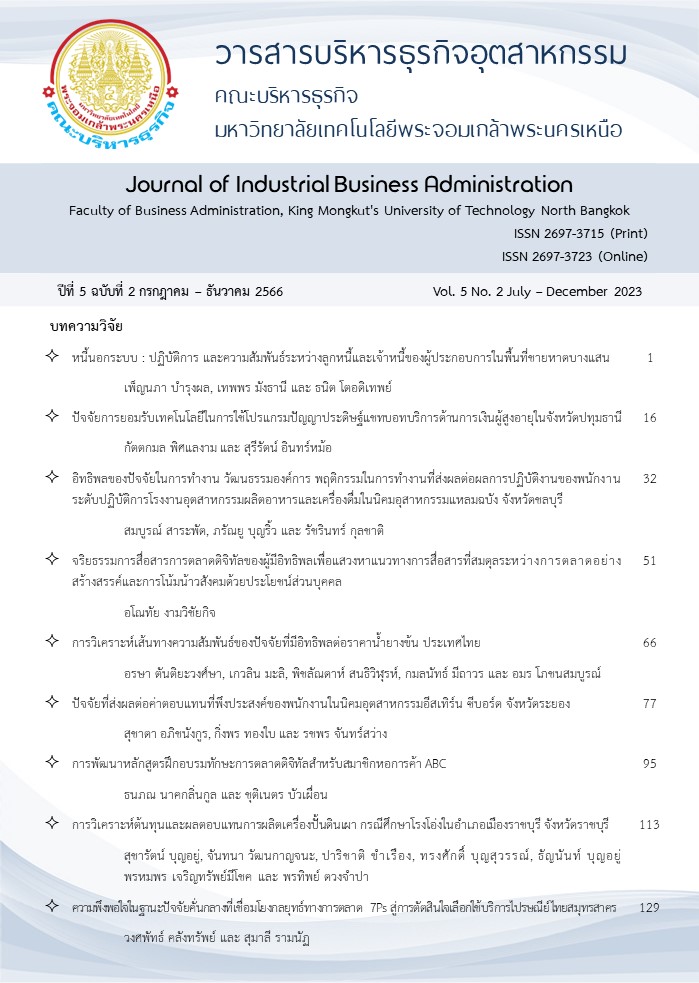The Influence of Work Factors, Organizational Culture, and Working Behavior Affecting the Job Performance of Operational Employees in the Food and Beverage Industry in Laem Chabang Industrial Estate, Chonburi Province
Keywords:
ปัจจัยในการทำงาน, วัฒนธรรมองค์การ, พฤติกรรมในการทำงาน, ผลการปฏิบัติงานAbstract
The main objective of this research was to the influence of work factors, organizational culture, and working behavior affecting the job performance of operational employees in the food and beverage industry in Laem Chabang industrial estate, Chonburi province. This research employed the survey research method. A questionnaire was used to collect data from the sample consisting of 294 operational employees in the food and beverage industry in Laem Chabang industrial estate. The quantitative data were analyzed using descriptive statistics of percentage, mean, and standard deviation, and inferential statistics of simple and multiple regression analyses. The results indicated that work factors, organizational culture, and working behavior affect job performance with a statistical significance of 0.05 level.
References
Beehr, T. A. & J. E. Newman. (1978). Job Stress Employee Health and Organization Effectiveness: A Facet Analysis Model and Literature Review. Personnel Psychology, 31(January): 665.
Borman, W. C. & S. J. Motowidlo. (1997). Task Performance and Contextual Performance: The Meaning for Personnel Selection Research. Human Performance, 10(2): 99-109.
Cameron & Ettington. (1988). the conceptual foundations of organizational culture. University of Michigan School of Business Administration. Ann Arbor Michigan 48109.
Carrroll, S. J., & Schneir, C. E. (1982) Performance appraisal and review system: The identification, measurement, and development of performance in organizations. Glenview, IL: Scott, Foresman. Cited in Sanghi, S. (2014) Human Resource Management, 2nd Edition. Vikas Publishing House.
Denison, D. R. & Mishra, A. K. (1995). Toward a Theory of Organizational Culture and Effectiveness. Organization Science, 6(2): 204-223.
Gomez-Mejia, L.R., Balkin, D.B. and Cardy, RL. (2008). Management: People, Performance, Change. New York: McGraw-Hill.
Hofstede, Geert & Hofstede, Gert Jan. (2005). Culture’s and Organizations Software of The Mind. New York: McGraw-Hill.
Johari, J. & K. K. Yahya. (2016). Job characteristics, work involvement, and job performance of public servants. European Journal of Training and Development, 40(7): 554-575.
Kalleberg, A. F. (1977). Work Values and Job Reward: A Theory of Job Satisfaction. American Sociological Review, 42 (December): 124.
Li, L. I., et al. (2017). Moderating effects of coping on work stress and job performance for nurses in tertiary hospitals: a cross-sectional survey in China. BMC Health Services Research, 17 (401): 1-8.
Muchinsky, P. M. (2006). Psychology Applied to Work: An Introduction to Industrial and Organizational Psychology. Belmont: Thomson.
Murphy, K. R. & J. N. Cleveland. (1991). Performance Appraisal: An Organizational Perspective. United States of America: Allyn and Bacon.
Schein, Edgar H. (2004). Organizational Culture and Leadership (3rd ed.). San Francisco: John Wiley& Sons.
Robbins, S.P. and Coulter, M. (2002). Management (3rd ed.). Prentice-Hall International, Inc., New Jersey.
Schermerhorn, J. R. (2002). Management (7th ed.). New York: John Wiley& Sons.
Smith, H. (1993). Creative Stress Management the 1-2-3 COPE System. New Jersey: Prentice-Hall International, Inc.
Johari, J .& K. K. Yahya. (2016). Job characteristics, work involvement, and job performance of public servants. European Journal of Training and Development, 40 (7): 554-575.
กาญจนา พรพันธ์เทศ และประพันธ์ ชัยกิจอุราใจ. (2562). วัฒนธรรมองค์การ และคุณภาพชีวิตในการทำงานที่ส่งผลต่อพฤติกรรมการเป็นสมาชิกที่ดีขององค์การและประสิทธิภาพในการปฏิบัติงานของพนักงานธนาคารภาครัฐแห่งหนึ่ง. วารสารวิทยบริการ มหาวิทยาลัยสงขลานครินทร์, 30(1): 53-65.
กัลยา วานิชย์บัญชา. (2556). การวิเคราะห์สถิติ : สถิติสำหรับการบริหารและวิจัย. พิมพ์ครั้งที่ 14. กรุงเทพฯ: ภาควิชาสถิติ คณะพาณิชยศาสตร์และการบัญชี จุฬาลงกรณ์มหาวิทยาลัย.
เกื้อจิตร ชีระกาญจน์ และคณะ. (2549). กรอบความคิดสำหรับการจัดการทรัพยากรมนุษย์. กรุงเทพมหานคร: เพียรสัน เอ็ดดูเคชั่น อินโดไชน่า.แปลจาก Dessler, G. n.d. A Framework for Human Resource Management. n.p.
ขวัญฤทัย ศรีชัยสันติกุล (2548) ปัจจัยในการทำงาน ความเชื่อ อำนาจควบคุมความเครียด และผลการปฏิบัติงาน ของพนักงานเทศบาลนครนนทบุรี. วิทยานิพนธ์วิทยาศาสตรมหาบัณฑิต สาขาจิตวิทยาอุตสาหกรรม, มหาวิทยาลัยเกษตรศาสตร์.
ชุมพร ทองสิงห์ และ ฉัตรชัย เหล่าเขตการณ์. (2565). ปัจจัยในการทำงานที่ส่งผลต่อประสิทธิภาพการปฏิบัติงานของพนักงานไทย และต่างชาติของบริษัทแห่งหนึ่งในจังหวัดสมุทรสาคร. วารสารมนุษยศาสตร์ และ สังคมศาสตร์มหาวิทยาลัยราชภัฏอุดรธานี. 11 (2): 163-174.
ธงชัย สันติวงษ์. (2546). การบริหารสู่ศตวรรษที่ 21. กรุงเทพมหานคร: ประชุมช่าง.
ธนาคารแห่งประเทศไทย. (2562). รายงานแนวโน้มธุรกิจ 2562 (Online). https://bit.ly/2yA8Xb3, 31 กรกฎาคม 2562.
นิคมอุตสาหกรรมแหลมฉบัง. (2562). รายงานการศึกษาความเหมาะสมการจัดตั้งเขตส่งเสริมเศรษฐกิจพิเศษเพื่อกิจการอุตสาหกรรม (Online). https://1th.me/wsN0, 17 กรกฎาคม 2562.
รัตติกรณ์ จงวิศาล. (2550). มนุษย์สัมพันธ์: พฤติกรรมมนุษย์ในองค์การ. กรุงเทพฯ: สำนักพิมพ์มหาวิทยาลัยเกษตรศาสตร์.
วรางคณา เอกอัจฉริยา และทิพทินนา สมุทรานนท์. (2558). การรับรู้วัฒนธรรมองค์การ คุณภาพชีวิตการทำงาน ความเครียดกับผลการปฏิบัติงานของพนักงานขายทางโทรศัพท์ในบริษัทประกันภัยแห่งหนึ่ง. วารสารศรีนครินทรวิโรฒวิจัยและพัฒนา (สาขามนุษยศาสตร์และสังคมศาสตร์), 7 (14): 77-95.
สายฝน กล้าเดินดง. (2552). การส่งเสริมพฤติกรรมการเป็นสมาชิกที่ดีต่อองค์การเพื่อการพัฒนาไปสู่ประสิทธิภาพในการทำงานที่ยั่งยืนของบุคลากรเจเนอเรชั่นวายในเขตกรุงเทพมหานคร. วารสารศรีปทุมปริทัศน์ฉบับมนุษยศาสตร์และสังคมศาสตร์, 9 (2): 29-42.
สุภาพร ชุมวรฐายี. (2555). ภาวะผู้นำ การสื่อสารระหว่างบุคคล วัฒนธรรมองค์การและผลการปฏิบัติงานของผู้บังคับบัญชาระดับต้น บริษัท ทรู คอร์ปอเรชั่น จำกัด (มหาชน). วารสารสังคมศาสตร์และมนุษยศาสตร์, 38 (1): 199-213.
Downloads
Published
How to Cite
Issue
Section
License
Copyright (c) 2023 Journal of Industrial Business Administration

This work is licensed under a Creative Commons Attribution-NonCommercial-NoDerivatives 4.0 International License.



